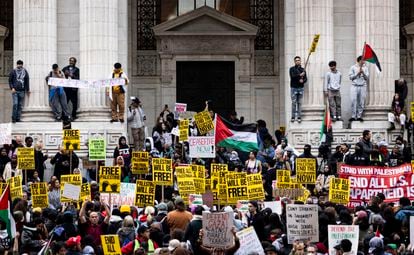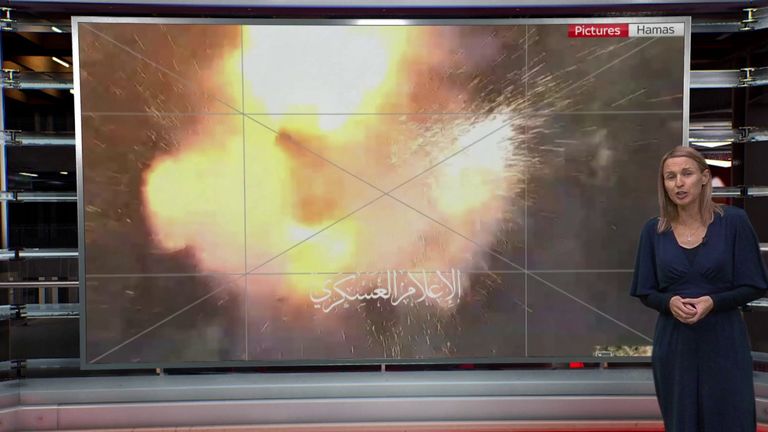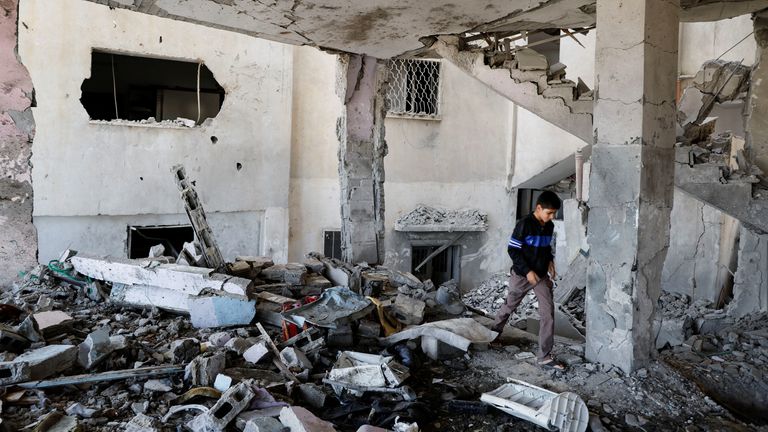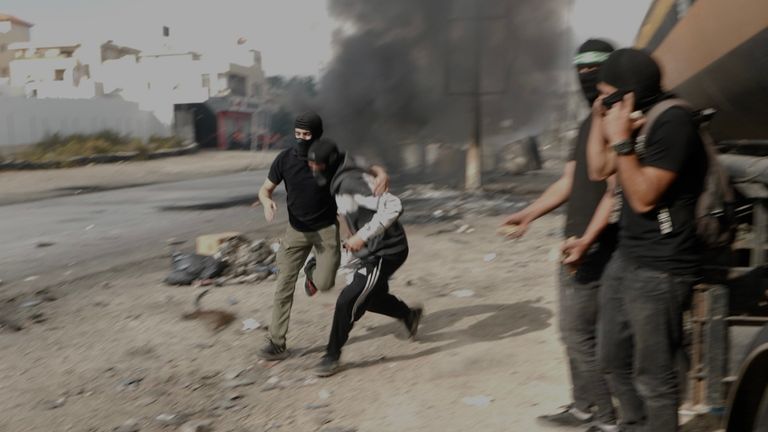Israel’s military response to Hamas’ October 7 attack is causing widespread international outrage, which was crystallized this week in a U.N. Security Council resolution calling for “urgent and extended humanitarian pauses and corridors” in Gaza for “a sufficient number” of days to allow full, rapid, safe and unimpeded access for U.N. agencies and their partners. The resolution is binding; however, nothing guarantees that this will happen. Now, as at other times in the past — when, for example, Israel was urged to stop its colonization of Palestinian territories — the international community is not effectively imposing its will on the Israeli state. Why?
The High Representative of the European Union for Foreign Affairs and Security Policy, Josep Borrell, said on Friday in Ramallah (West Bank) that what is currently happening in Gaza “is the consequence of a political and moral failure of the international community,” which for decades has theoretically supported a two-state solution without doing “what it should have” to make it “a reality.” Borrell insisted that because of this failure, “the Israeli and Palestinian people are paying a high price.”
This general statement has specific derivations once applied to the Israeli side, the dominant force in the conflict and occupying power. From this point of view, the United States has a relevant share of responsibility in the collective failure mentioned by Borrell. The support and protection of Washington — the only actor with real influence over Israel, in view of the fundamental military support it provides, and with veto power in the Security Council — is an essential key to understanding Israel’s margin for action. European countries also bear responsibility, but less so because of their lesser capacity to influence Israel.
The position of a hegemonic force like the U.S. and the institutional design of the U.N. — which prevents it from being effective in security matters unless there is consensus among its members — explain why, although large majorities in the General Assembly or even in the U.N. Security Council have condemned Israel’s actions, this political will has not had any real consequences on the round. Washington has at times let resolutions pass that have been uncomfortable for its ally, but it has never exerted or permitted substantial pressure to fully achieve certain objectives, be they humanitarian pauses, a halt to colonization or the establishment of a Palestinian state.
In the current crisis, Israel suffered a barbaric attack by Hamas that gave it the right to self-defense. The manner in which this is being carried out is causing immense human suffering, through tactics of collective punishment that many experts consider to be war crimes. Despite international pressure, Israel continues with its massive bombardments and siege on the Gaza Strip, which allows only a tiny amount of basic products such as food, water, or fuel to pass through. The episode is just the latest in Israel’s long pattern of excesses and abuses in its legitimate attempt to guarantee its security.
Here are some clues and data to delve deeper into the question of the leverage that various international actors have over Israel’s actions and why they have not used it to its fullest extent.
The protection of the U.S.
The history of the State of Israel cannot be understood without the active support of the United States, which has been supporting and protecting the Jewish State for decades.
Whether for genuine political and moral convictions (wanting to defend a safe home for the people who suffered the most tremendous persecution in the history of mankind), for domestic political reasons (considering the considerable influence of the Jewish community on American politics) or for strategic interests in the region (given that several Arab countries have opted to ally themselves with the former USSR and the confrontation with Iran since the establishment of the Islamic Republic), Washington’s support of Israel has been unwavering. A support that comes in the form of powerful military aid and political cover in the U.N.
This does not mean that their relationship has not had its ups and downs. While the U.S. has on countless occasions blocked U.N. initiatives aimed at Israel by wielding its veto power, it also has in a number of significant circumstances — out of exasperation — let its ally down. A famous example would be Resolution 2334 of 2016, which the Barack Obama administration let through and which dealt a tremendous blow to Israeli colonization. This week’s resolution, which the U.S. let pass and which does not even include a condemnation of the Hamas attack, is another strong critical signal. In many other situations the U.S. has bilaterally or even publicly expressed its displeasure with certain Israeli policies, and there is no doubt that unobvious U.S. pressure has achieved significant results in the region in recent history.
But Washington has never given — or allowed to be given — a decisive push to end the occupation, to end colonization, to establish a Palestinian state, to stop military campaigns that might have been even more brutal without its actions, but which in any case have caused atrocious suffering to civilians and, according to many experts, abundant war crimes.
The U.S. is Israel’s great military ally and thus has the most influence over it. If the U.S. were to make this aid conditional on the respect of certain limits, it would probably be very effective, given its fundamental influence over Israel.
Over the decades, Washington’s support has been of enormous quantity and quality, making Israel the powerful military power in the region that it is. In the decade covered by the current Memorandum of Understanding (MOU), which was signed in 2016, Washington plans to provide military aid to Israel to the tune of $38 billion. This represents approximately twice the total annual defense budget of a country like Spain, which is much larger in terms of economy and population than Israel. There are estimates that the total amount of U.S. taxpayer military aid to Israel exceeds $300 billion when adjusted for inflation.
Not only is the quantity enormous: the quality is decisive. The U.S. is pursuing an active policy that seeks to guarantee that Israel will always have a qualitative edge over its adversaries. Thus, for example, Israel was the first country to receive American-made F-35 fighter planes, the most advanced in the world, and the U.S. helped fund and produce the Iron Dome, Israel’s anti-missile defense system.
 People gather for a protest against Israel’s ongoing military operation in the Gaza Strip, in New York on November 9, 2023.JUSTIN LANE (EFE)
People gather for a protest against Israel’s ongoing military operation in the Gaza Strip, in New York on November 9, 2023.JUSTIN LANE (EFE)
To imagine the U.S. supporting a sanctions initiative at the U.N. for illegal colonization is practically impossible. But what would have happened if the delivery of F-35s and critical parts for Iron Dome had been conditioned on a freeze on colonization, or on the acceptance of a humanitarian pause in the current Gaza conflict?
Europe’s acquiescence
While the responsibility of the U.S. deserves priority consideration in the collective failure of which Borrell speaks, Europe also has a significant share. There are two levels, that of the EU as a bloc, and the national positions of individual states, which obviously influence the former, but also have their own course.
The EU is not a geopolitical or military power, and in that sense it lacks important levers of influence. However, the EU is Israel’s number one trading partner. Last year, 28% of Israel’s trade in goods was with countries in the EU. This is not the same as being an essential supplier of arsenals, but it is not insignificant either. South Africa’s apartheid did not fall by means of hard power, but through enormous diplomatic, commercial, cultural and media pressure.
However, the EU is finding it difficult to articulate common positions on this issue. A late October resolution at the U.N. General Assembly also calling for a humanitarian truce — which passed by 120 votes in favor, 45 abstentions and 14 against, including Israel and the U.S. — is a good illustration of this disjointedness: some EU countries were in favor, a number were against and others abstained.
Specifically, Germany’s Nazi past paralyzes the leading European power on this issue. Having collaborated with Nazi Germany continues to weigh Italy down. And France, the EU’s second-largest power, is home to Europe’s largest Jewish community.
The enormous caution of important countries and internal disagreements explain, at least in part, why the EU has never taken any major action to try to exert influence on Israel. Even measures on the mere labeling of products from occupied and colonized territories have been met with difficulties.
Russia, a Eurasian power, has cultivated increasingly close relations with Israel during Vladimir Putin’s two decades in power. While Russia has never had the type of influence that Western powers have, this policy of rapprochement with Israel has in any case inhibited tangible moves. This is changing, with the ever closer relationship between Moscow and Tehran. Time will tell what the consequences will be.
 Benjamin Netanyahu and Vladimir Putin, in 2020 in Moscow.MAXIM SHEMETOV (Reuters)
Benjamin Netanyahu and Vladimir Putin, in 2020 in Moscow.MAXIM SHEMETOV (Reuters)
The impotence of the U.N.
This underlying political reality has a major impact on the ability of the United Nations to translate policy statements with overwhelming support into reality on the ground.
The U.N. has instruments to give an executive dimension to its decisions, to influence the actual course of events, such as the deployment of peacekeeping missions — there are currently 12, with 90,000 troops — or the imposition of sanctions which, although with limited effectiveness, do represent a powerful instrument of pressure.
The U.N., moreover, embodied in the 2005 World Summit conclusions the concept of “responsibility to protect,” according to which (art. 138) each state has the responsibility to protect its population from genocide, war crimes, ethnic cleansing and crimes against humanity; and (art. 139) the international community also has the responsibility to protect peoples from such crimes through peaceful means. “In this context, we are prepared to take collective action, in a timely and decisive manner, […] should peaceful means be inadequate and national authorities manifestly fail to protect their populations from genocide, war crimes, ethnic cleansing and crimes against humanity,” reads the article.
The principle has been invoked on some occasions in past international crises (i.e., Libya). In the Gaza conflict, some experts believe that it is not applicable, because it refers to the duty of states to protect their population, and Gazans would not fall into that category vis-à-vis Israel. But others opine that, since the U.N. considers the Strip as being occupied by Israel, the country is responsible for the population residing there.
In any case, by one means or another, any executive action requires a political will that has never been forthcoming, especially given the ironclad protection that the U.S. has provided to its ally in the Security Council.
Conclusions
The Israeli-Palestinian conflict is one of immense complexity that gives rise to disparate political judgments. There are serious responsibilities on both sides. Israel, as an occupying power, has specific responsibilities. As a democracy, it should have moral standards that cannot be expected from an organization such as Hamas, considered terrorist by the EU. Several of its policies have been labeled unlawful by the international community, and many experts consider it to be racking up war crimes. There are no judgments on these cases because Israel is not a party to the Rome Statute and therefore not subject to the International Criminal Court, but after Palestine was admitted as a member a few years ago, investigations have begun and judgments could be forthcoming in the coming years.
In the meantime, the reality is that Israel’s actions, whether considered justified or not, have only been possible because of the active backing of a hegemonic power — the United States — and an executive incapacity of the U.N. largely derived from that backing.
Sign up for our weekly newsletter to get more English-language news coverage from EL PAÍS USA Edition




/cloudfront-us-east-2.images.arcpublishing.com/reuters/GOKBNM77U5J5XEMTAEFMSNWMYU.jpg)


:quality(70):focal(3135x1963:3145x1973)/cloudfront-eu-central-1.images.arcpublishing.com/irishtimes/Z3BNQQT7ISEXDYCK5DZIRZKNPQ.jpg)


